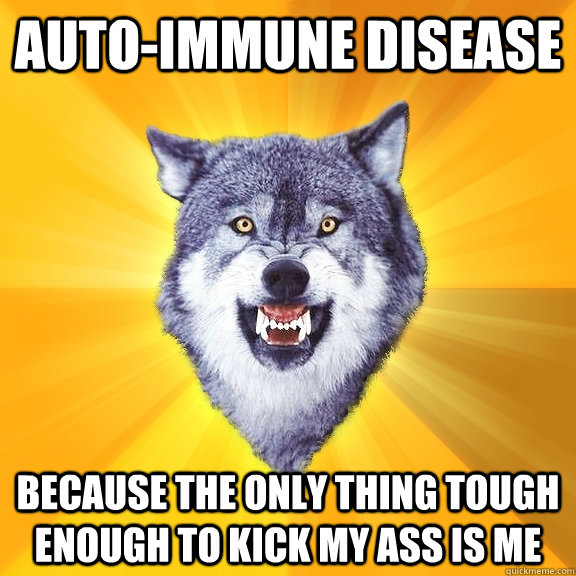 |
| Link |
10 months of taking thyroid blocking medication, and later on synthetic thyroid hormones. And that was when my symptoms weren't as severe as those of other thyroid patients. Or at least, that's what I try to believe. Or maybe I'm just not as much of a complainer compared to other patients.
Mind you, there have been times when I've told my thyroid to just kick the meds and go into a thyroid storm to kill me off. There have been times when I've whispered "Well, you stupid thyroid blocking meds.. How about you cause a bout of agranulocytosis (alarmingly low white blood cell count) and kill me off? We could be done with this bullshit."
I've had those dark thoughts both during hyper- and hypothyroid periods. Even as my hormone levels in the blood were returning to their baseline, some of the symptoms persisted.
But I figured that they're just part of life as a thyroid patient. Sure, I'd rather not be ill. I'd rather be the same, somewhat powerful woman I was sometime ago. The one who had a resting heart rate of 56bpm, a blood pressure of 107/80mmHg and lots of muscle - so much that doctors and physical therapists alike have commented about my muscle mass.
But alas, it seems like getting back to that old level might take me a bit more time. And that's alright.
People with autoimmune diseases need to realize this: You are fighting a battle against your own body. Parts of your body have turned against you, and humans, and for that matter, almost all creatures out there were made/selected (depending on your belief system) to be resilient. The part of you which has gone renegade on you is super resilient as well. It's going to try to sucker punch you, and if that doesn't work, it'll try to pound you into the ground in some other way.
It's not going to be an easy fight unless you somehow luck out.
Even modern-day medicine sometimes has a tough time fighting your renegade body parts.
 |
| Link |
But that's why we have to grit our teeth and refuse to give in. Fighting is not all RAWRRAWR and diving head-first into a confrontation. Parts of it is also patience and a bit of resilience, something which a lot of my fellow patients sometimes seem to lack. I've seen plenty of patients bring grief upon themselves and their doctors by almost aggressively trying to speed up the process of healing.
I initially aggressively tried to force my recovery too (just not on the doctor), and tried to force my body to continue to function at its old, pre-disease level. But I've shed plenty of tears in that period, until I learned to just amble along. I accepted that I had a disease where my body had gone renegade against itself, and that it was capable of messing me up quite badly. I accepted that it would take some time for me to recover, and that acceptance has somehow made it a lot easier for me to deal with it.
It's not the same as letting the disease defeat you (or that's what I'd like to think). Think of it as calling in additional troops (doctors, medication, radioactive iodine, surgery etc) whilst trying to outlast the opponent.
And maybe I lucked out, but the difference between me and some of my fellow patients that are still dealing with major issues seems to be that I'm more accepting of the hopefully temporary decreased level of functioning.
Mind you.. Stress seems to play an important role in diseases like Graves' disease..
So maybe one should try to exercise a bit more patience instead of aggressively hounding often-reasonable doctors. ;)
*Means strong enough to get back to practicing martial arts, no severe depressive episodes, no random muscle aches or twitches/fasciculations, no bouts of anxiety that sometimes border near-panic attacks.. All in all, it seems like I'm finally becoming badass again!
And yeah, sure. Sometimes, there are other factors that are severely slowing down someone's recovery as well. But given the amount of people yelling on the internet about X deficiency or whatsoever who've returned with a negative test.. I wouldn't put too much faith in that.
No comments:
Post a Comment